Leadership Development: A Semester Reflection and Insights
VerifiedAdded on 2020/04/01
|10
|2568
|45
Essay
AI Summary
This essay presents a student's reflection on their understanding of leadership, significantly altered and enhanced through a semester-long course. Initially viewing leadership as power and authority, the student's perspective evolved to encompass concepts like servant leadership, ethical considerations, and the distinction between leadership and management. The reflection highlights key leadership competencies, including communication, integrity, and decision-making, while acknowledging areas for personal improvement, such as public speaking and cross-cultural leadership. The essay emphasizes the importance of ethical leadership, organizational culture, and the continuous development of leadership skills through practical experience and engagement with various leadership theories. The student concludes by summarizing their transformed comprehension of leadership and outlining their plans for future growth in this domain.
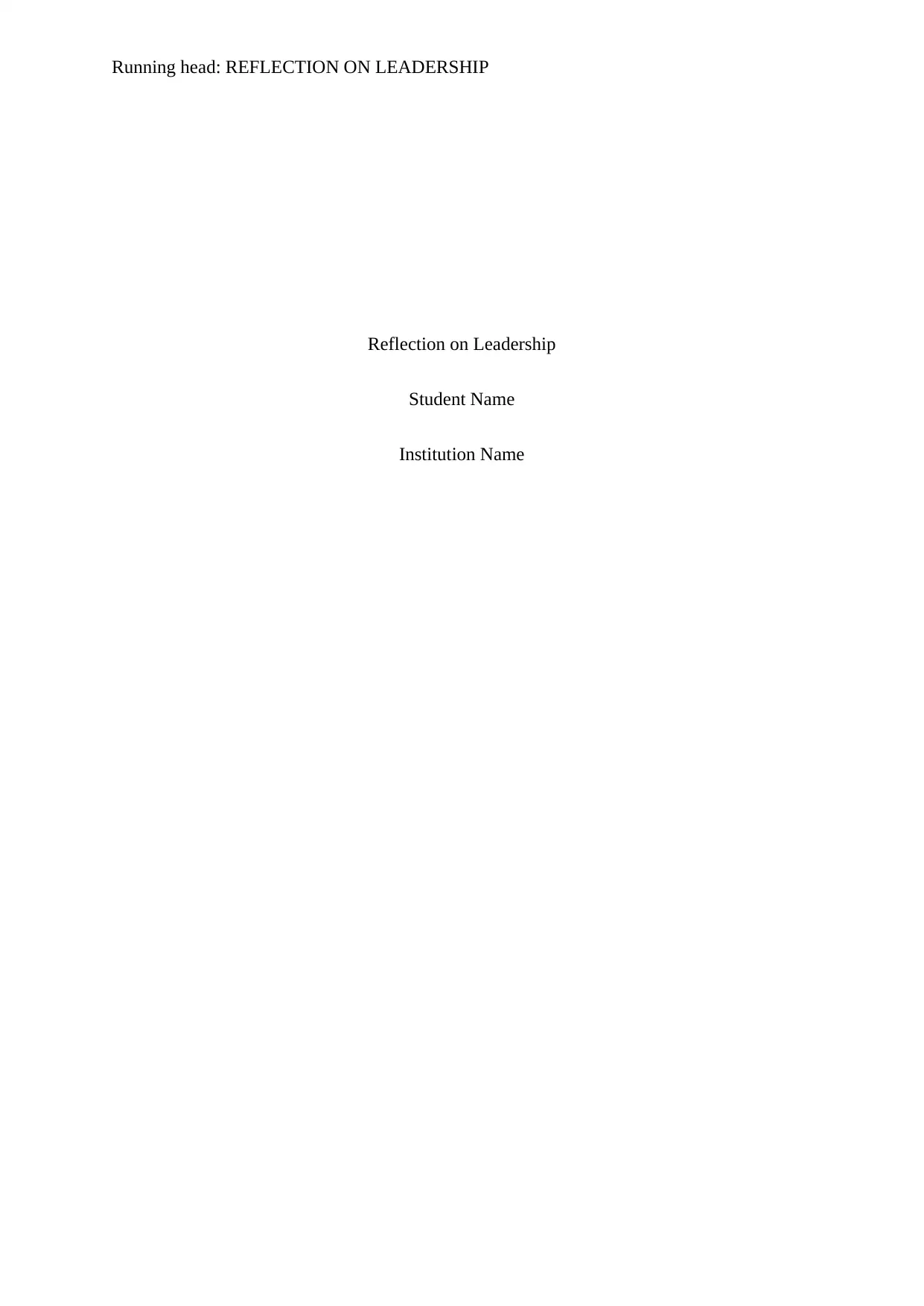
Running head: REFLECTION ON LEADERSHIP
Reflection on Leadership
Student Name
Institution Name
Reflection on Leadership
Student Name
Institution Name
Paraphrase This Document
Need a fresh take? Get an instant paraphrase of this document with our AI Paraphraser
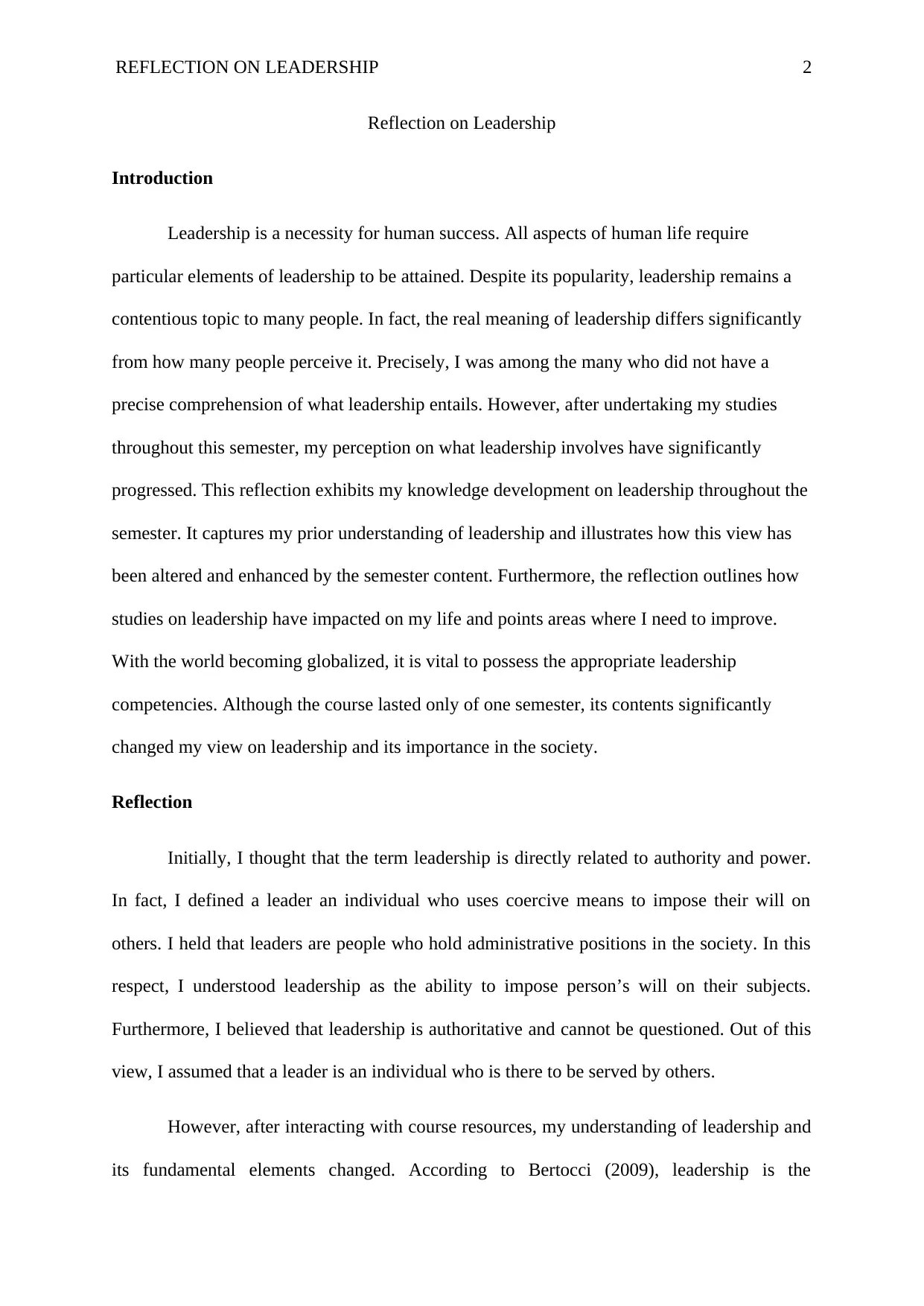
REFLECTION ON LEADERSHIP 2
Reflection on Leadership
Introduction
Leadership is a necessity for human success. All aspects of human life require
particular elements of leadership to be attained. Despite its popularity, leadership remains a
contentious topic to many people. In fact, the real meaning of leadership differs significantly
from how many people perceive it. Precisely, I was among the many who did not have a
precise comprehension of what leadership entails. However, after undertaking my studies
throughout this semester, my perception on what leadership involves have significantly
progressed. This reflection exhibits my knowledge development on leadership throughout the
semester. It captures my prior understanding of leadership and illustrates how this view has
been altered and enhanced by the semester content. Furthermore, the reflection outlines how
studies on leadership have impacted on my life and points areas where I need to improve.
With the world becoming globalized, it is vital to possess the appropriate leadership
competencies. Although the course lasted only of one semester, its contents significantly
changed my view on leadership and its importance in the society.
Reflection
Initially, I thought that the term leadership is directly related to authority and power.
In fact, I defined a leader an individual who uses coercive means to impose their will on
others. I held that leaders are people who hold administrative positions in the society. In this
respect, I understood leadership as the ability to impose person’s will on their subjects.
Furthermore, I believed that leadership is authoritative and cannot be questioned. Out of this
view, I assumed that a leader is an individual who is there to be served by others.
However, after interacting with course resources, my understanding of leadership and
its fundamental elements changed. According to Bertocci (2009), leadership is the
Reflection on Leadership
Introduction
Leadership is a necessity for human success. All aspects of human life require
particular elements of leadership to be attained. Despite its popularity, leadership remains a
contentious topic to many people. In fact, the real meaning of leadership differs significantly
from how many people perceive it. Precisely, I was among the many who did not have a
precise comprehension of what leadership entails. However, after undertaking my studies
throughout this semester, my perception on what leadership involves have significantly
progressed. This reflection exhibits my knowledge development on leadership throughout the
semester. It captures my prior understanding of leadership and illustrates how this view has
been altered and enhanced by the semester content. Furthermore, the reflection outlines how
studies on leadership have impacted on my life and points areas where I need to improve.
With the world becoming globalized, it is vital to possess the appropriate leadership
competencies. Although the course lasted only of one semester, its contents significantly
changed my view on leadership and its importance in the society.
Reflection
Initially, I thought that the term leadership is directly related to authority and power.
In fact, I defined a leader an individual who uses coercive means to impose their will on
others. I held that leaders are people who hold administrative positions in the society. In this
respect, I understood leadership as the ability to impose person’s will on their subjects.
Furthermore, I believed that leadership is authoritative and cannot be questioned. Out of this
view, I assumed that a leader is an individual who is there to be served by others.
However, after interacting with course resources, my understanding of leadership and
its fundamental elements changed. According to Bertocci (2009), leadership is the
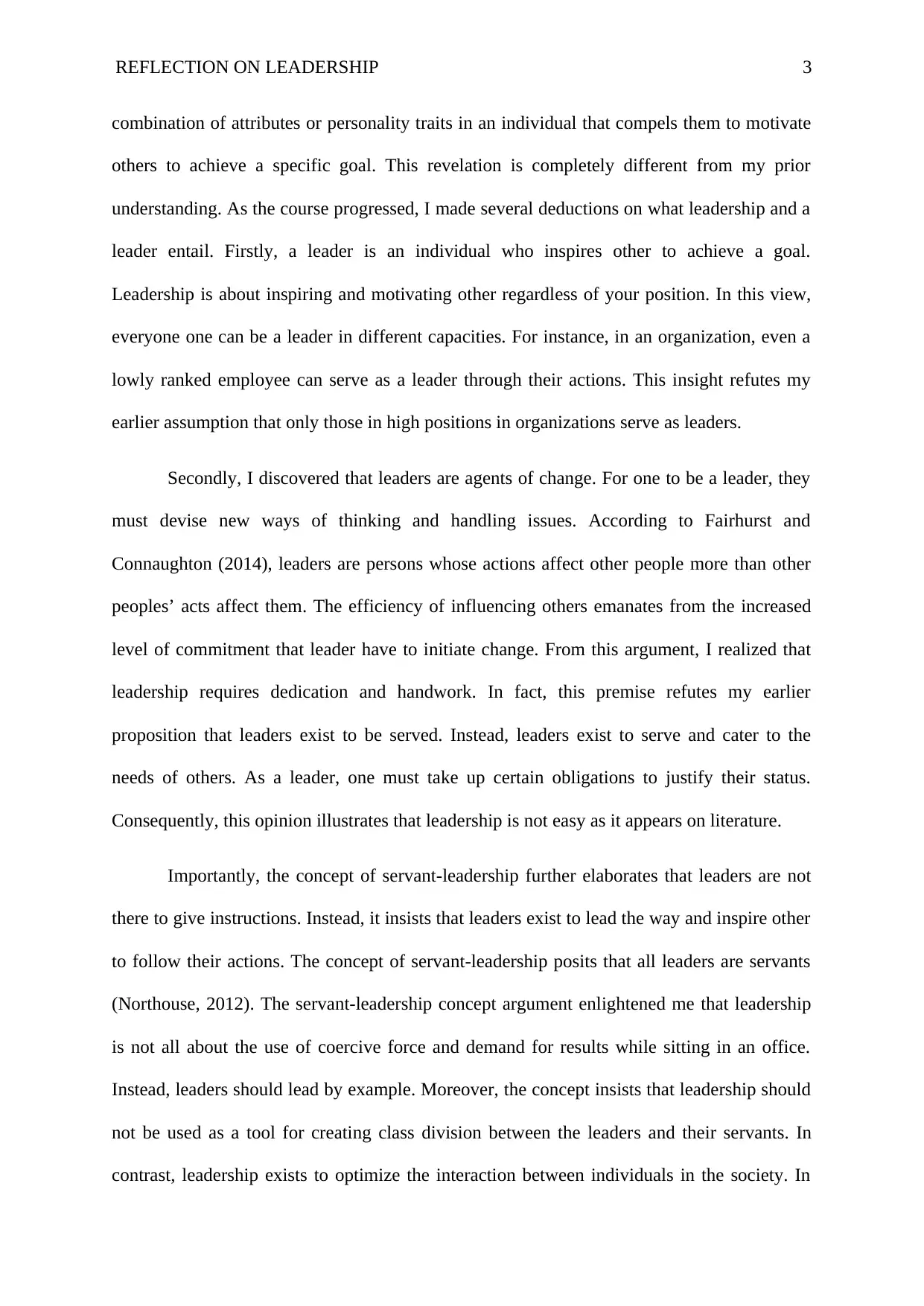
REFLECTION ON LEADERSHIP 3
combination of attributes or personality traits in an individual that compels them to motivate
others to achieve a specific goal. This revelation is completely different from my prior
understanding. As the course progressed, I made several deductions on what leadership and a
leader entail. Firstly, a leader is an individual who inspires other to achieve a goal.
Leadership is about inspiring and motivating other regardless of your position. In this view,
everyone one can be a leader in different capacities. For instance, in an organization, even a
lowly ranked employee can serve as a leader through their actions. This insight refutes my
earlier assumption that only those in high positions in organizations serve as leaders.
Secondly, I discovered that leaders are agents of change. For one to be a leader, they
must devise new ways of thinking and handling issues. According to Fairhurst and
Connaughton (2014), leaders are persons whose actions affect other people more than other
peoples’ acts affect them. The efficiency of influencing others emanates from the increased
level of commitment that leader have to initiate change. From this argument, I realized that
leadership requires dedication and handwork. In fact, this premise refutes my earlier
proposition that leaders exist to be served. Instead, leaders exist to serve and cater to the
needs of others. As a leader, one must take up certain obligations to justify their status.
Consequently, this opinion illustrates that leadership is not easy as it appears on literature.
Importantly, the concept of servant-leadership further elaborates that leaders are not
there to give instructions. Instead, it insists that leaders exist to lead the way and inspire other
to follow their actions. The concept of servant-leadership posits that all leaders are servants
(Northouse, 2012). The servant-leadership concept argument enlightened me that leadership
is not all about the use of coercive force and demand for results while sitting in an office.
Instead, leaders should lead by example. Moreover, the concept insists that leadership should
not be used as a tool for creating class division between the leaders and their servants. In
contrast, leadership exists to optimize the interaction between individuals in the society. In
combination of attributes or personality traits in an individual that compels them to motivate
others to achieve a specific goal. This revelation is completely different from my prior
understanding. As the course progressed, I made several deductions on what leadership and a
leader entail. Firstly, a leader is an individual who inspires other to achieve a goal.
Leadership is about inspiring and motivating other regardless of your position. In this view,
everyone one can be a leader in different capacities. For instance, in an organization, even a
lowly ranked employee can serve as a leader through their actions. This insight refutes my
earlier assumption that only those in high positions in organizations serve as leaders.
Secondly, I discovered that leaders are agents of change. For one to be a leader, they
must devise new ways of thinking and handling issues. According to Fairhurst and
Connaughton (2014), leaders are persons whose actions affect other people more than other
peoples’ acts affect them. The efficiency of influencing others emanates from the increased
level of commitment that leader have to initiate change. From this argument, I realized that
leadership requires dedication and handwork. In fact, this premise refutes my earlier
proposition that leaders exist to be served. Instead, leaders exist to serve and cater to the
needs of others. As a leader, one must take up certain obligations to justify their status.
Consequently, this opinion illustrates that leadership is not easy as it appears on literature.
Importantly, the concept of servant-leadership further elaborates that leaders are not
there to give instructions. Instead, it insists that leaders exist to lead the way and inspire other
to follow their actions. The concept of servant-leadership posits that all leaders are servants
(Northouse, 2012). The servant-leadership concept argument enlightened me that leadership
is not all about the use of coercive force and demand for results while sitting in an office.
Instead, leaders should lead by example. Moreover, the concept insists that leadership should
not be used as a tool for creating class division between the leaders and their servants. In
contrast, leadership exists to optimize the interaction between individuals in the society. In
⊘ This is a preview!⊘
Do you want full access?
Subscribe today to unlock all pages.

Trusted by 1+ million students worldwide
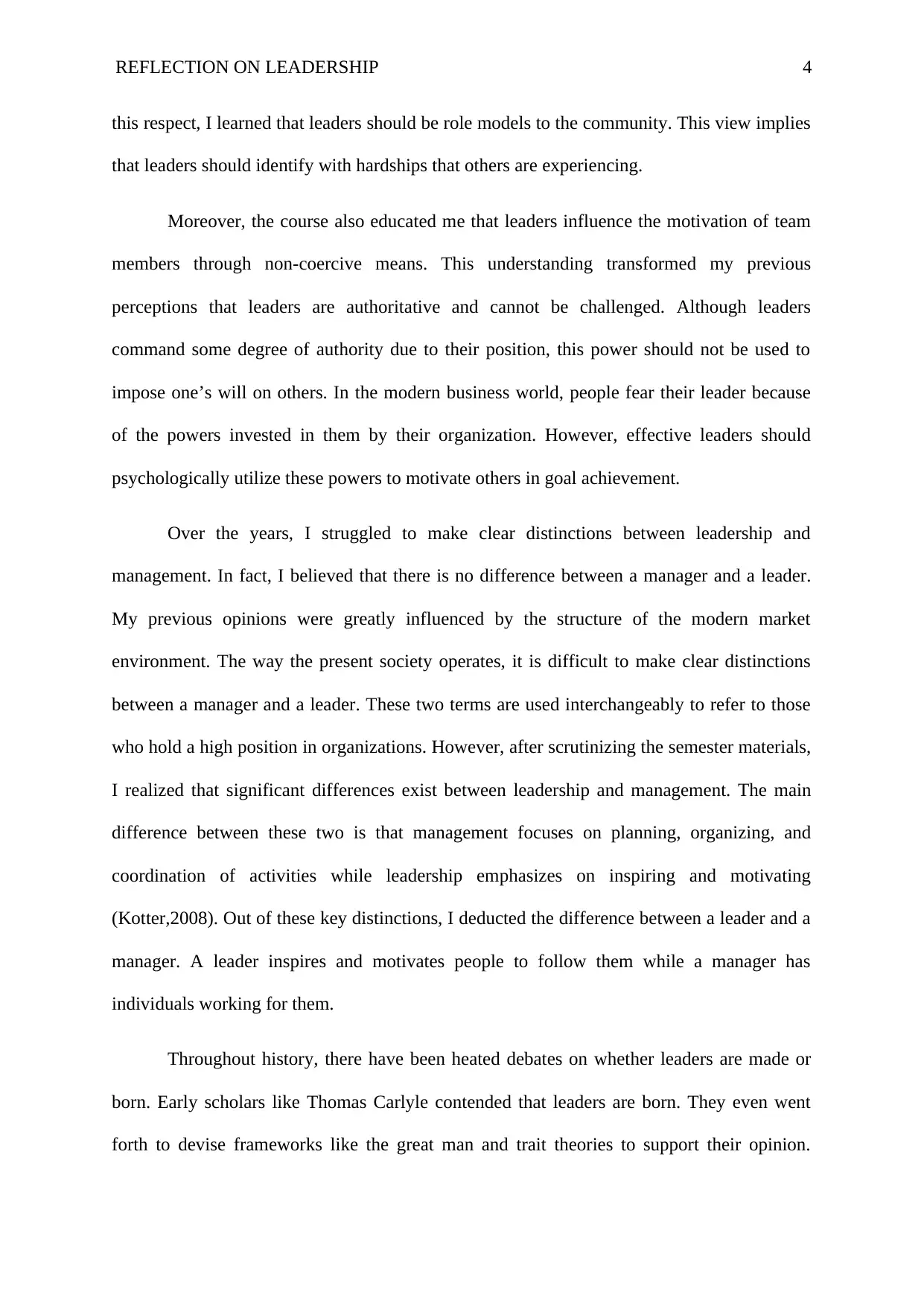
REFLECTION ON LEADERSHIP 4
this respect, I learned that leaders should be role models to the community. This view implies
that leaders should identify with hardships that others are experiencing.
Moreover, the course also educated me that leaders influence the motivation of team
members through non-coercive means. This understanding transformed my previous
perceptions that leaders are authoritative and cannot be challenged. Although leaders
command some degree of authority due to their position, this power should not be used to
impose one’s will on others. In the modern business world, people fear their leader because
of the powers invested in them by their organization. However, effective leaders should
psychologically utilize these powers to motivate others in goal achievement.
Over the years, I struggled to make clear distinctions between leadership and
management. In fact, I believed that there is no difference between a manager and a leader.
My previous opinions were greatly influenced by the structure of the modern market
environment. The way the present society operates, it is difficult to make clear distinctions
between a manager and a leader. These two terms are used interchangeably to refer to those
who hold a high position in organizations. However, after scrutinizing the semester materials,
I realized that significant differences exist between leadership and management. The main
difference between these two is that management focuses on planning, organizing, and
coordination of activities while leadership emphasizes on inspiring and motivating
(Kotter,2008). Out of these key distinctions, I deducted the difference between a leader and a
manager. A leader inspires and motivates people to follow them while a manager has
individuals working for them.
Throughout history, there have been heated debates on whether leaders are made or
born. Early scholars like Thomas Carlyle contended that leaders are born. They even went
forth to devise frameworks like the great man and trait theories to support their opinion.
this respect, I learned that leaders should be role models to the community. This view implies
that leaders should identify with hardships that others are experiencing.
Moreover, the course also educated me that leaders influence the motivation of team
members through non-coercive means. This understanding transformed my previous
perceptions that leaders are authoritative and cannot be challenged. Although leaders
command some degree of authority due to their position, this power should not be used to
impose one’s will on others. In the modern business world, people fear their leader because
of the powers invested in them by their organization. However, effective leaders should
psychologically utilize these powers to motivate others in goal achievement.
Over the years, I struggled to make clear distinctions between leadership and
management. In fact, I believed that there is no difference between a manager and a leader.
My previous opinions were greatly influenced by the structure of the modern market
environment. The way the present society operates, it is difficult to make clear distinctions
between a manager and a leader. These two terms are used interchangeably to refer to those
who hold a high position in organizations. However, after scrutinizing the semester materials,
I realized that significant differences exist between leadership and management. The main
difference between these two is that management focuses on planning, organizing, and
coordination of activities while leadership emphasizes on inspiring and motivating
(Kotter,2008). Out of these key distinctions, I deducted the difference between a leader and a
manager. A leader inspires and motivates people to follow them while a manager has
individuals working for them.
Throughout history, there have been heated debates on whether leaders are made or
born. Early scholars like Thomas Carlyle contended that leaders are born. They even went
forth to devise frameworks like the great man and trait theories to support their opinion.
Paraphrase This Document
Need a fresh take? Get an instant paraphrase of this document with our AI Paraphraser
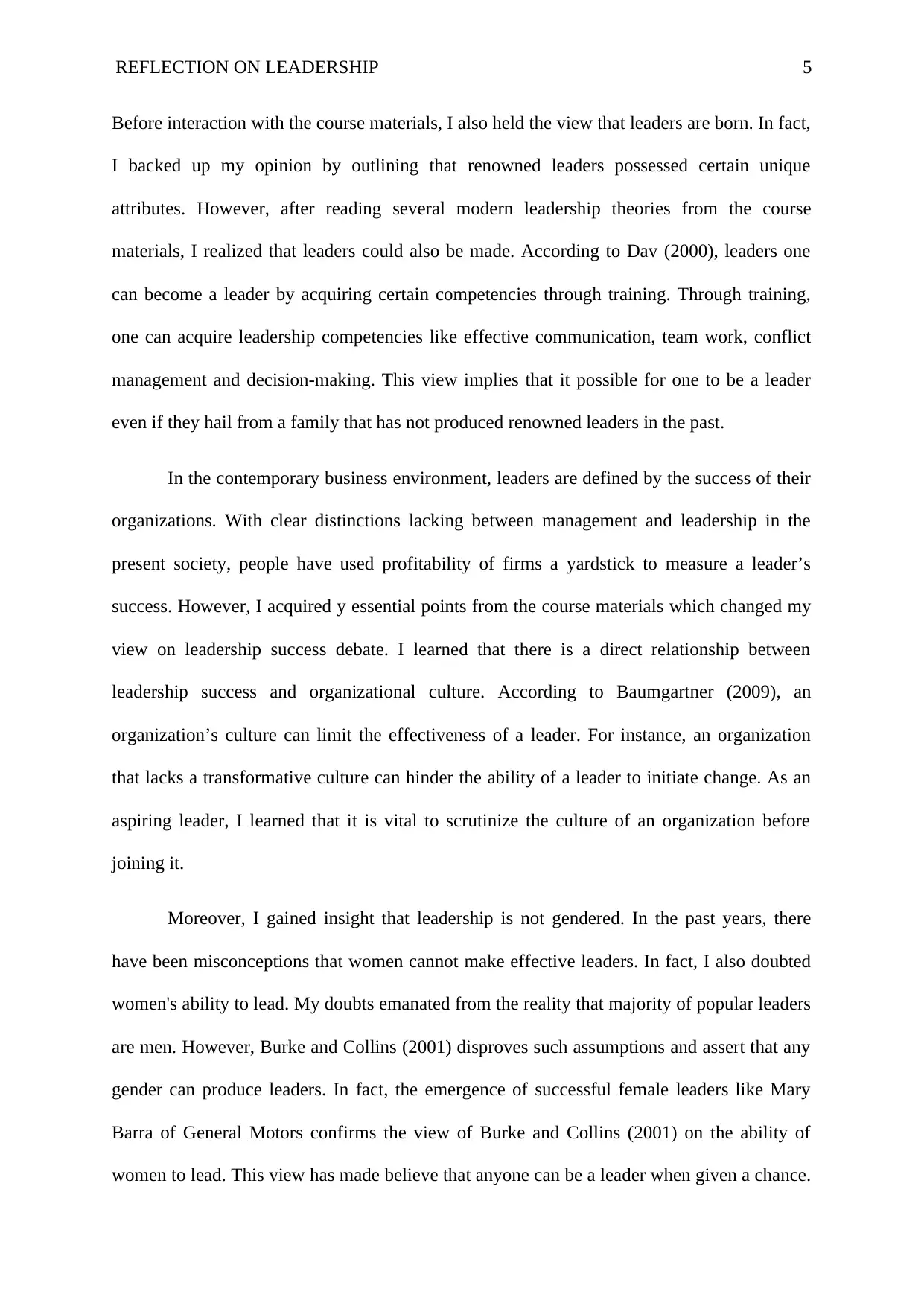
REFLECTION ON LEADERSHIP 5
Before interaction with the course materials, I also held the view that leaders are born. In fact,
I backed up my opinion by outlining that renowned leaders possessed certain unique
attributes. However, after reading several modern leadership theories from the course
materials, I realized that leaders could also be made. According to Dav (2000), leaders one
can become a leader by acquiring certain competencies through training. Through training,
one can acquire leadership competencies like effective communication, team work, conflict
management and decision-making. This view implies that it possible for one to be a leader
even if they hail from a family that has not produced renowned leaders in the past.
In the contemporary business environment, leaders are defined by the success of their
organizations. With clear distinctions lacking between management and leadership in the
present society, people have used profitability of firms a yardstick to measure a leader’s
success. However, I acquired y essential points from the course materials which changed my
view on leadership success debate. I learned that there is a direct relationship between
leadership success and organizational culture. According to Baumgartner (2009), an
organization’s culture can limit the effectiveness of a leader. For instance, an organization
that lacks a transformative culture can hinder the ability of a leader to initiate change. As an
aspiring leader, I learned that it is vital to scrutinize the culture of an organization before
joining it.
Moreover, I gained insight that leadership is not gendered. In the past years, there
have been misconceptions that women cannot make effective leaders. In fact, I also doubted
women's ability to lead. My doubts emanated from the reality that majority of popular leaders
are men. However, Burke and Collins (2001) disproves such assumptions and assert that any
gender can produce leaders. In fact, the emergence of successful female leaders like Mary
Barra of General Motors confirms the view of Burke and Collins (2001) on the ability of
women to lead. This view has made believe that anyone can be a leader when given a chance.
Before interaction with the course materials, I also held the view that leaders are born. In fact,
I backed up my opinion by outlining that renowned leaders possessed certain unique
attributes. However, after reading several modern leadership theories from the course
materials, I realized that leaders could also be made. According to Dav (2000), leaders one
can become a leader by acquiring certain competencies through training. Through training,
one can acquire leadership competencies like effective communication, team work, conflict
management and decision-making. This view implies that it possible for one to be a leader
even if they hail from a family that has not produced renowned leaders in the past.
In the contemporary business environment, leaders are defined by the success of their
organizations. With clear distinctions lacking between management and leadership in the
present society, people have used profitability of firms a yardstick to measure a leader’s
success. However, I acquired y essential points from the course materials which changed my
view on leadership success debate. I learned that there is a direct relationship between
leadership success and organizational culture. According to Baumgartner (2009), an
organization’s culture can limit the effectiveness of a leader. For instance, an organization
that lacks a transformative culture can hinder the ability of a leader to initiate change. As an
aspiring leader, I learned that it is vital to scrutinize the culture of an organization before
joining it.
Moreover, I gained insight that leadership is not gendered. In the past years, there
have been misconceptions that women cannot make effective leaders. In fact, I also doubted
women's ability to lead. My doubts emanated from the reality that majority of popular leaders
are men. However, Burke and Collins (2001) disproves such assumptions and assert that any
gender can produce leaders. In fact, the emergence of successful female leaders like Mary
Barra of General Motors confirms the view of Burke and Collins (2001) on the ability of
women to lead. This view has made believe that anyone can be a leader when given a chance.
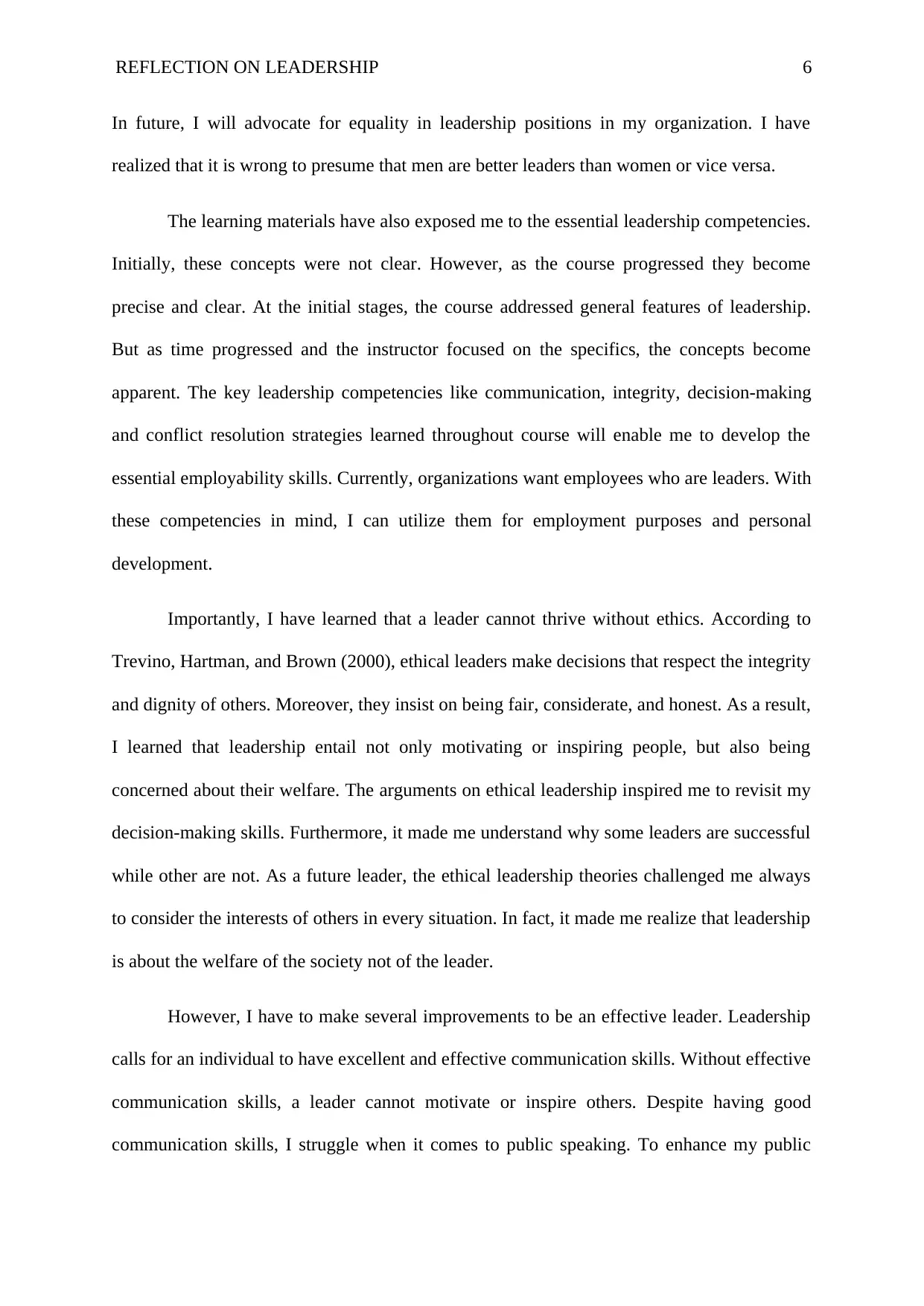
REFLECTION ON LEADERSHIP 6
In future, I will advocate for equality in leadership positions in my organization. I have
realized that it is wrong to presume that men are better leaders than women or vice versa.
The learning materials have also exposed me to the essential leadership competencies.
Initially, these concepts were not clear. However, as the course progressed they become
precise and clear. At the initial stages, the course addressed general features of leadership.
But as time progressed and the instructor focused on the specifics, the concepts become
apparent. The key leadership competencies like communication, integrity, decision-making
and conflict resolution strategies learned throughout course will enable me to develop the
essential employability skills. Currently, organizations want employees who are leaders. With
these competencies in mind, I can utilize them for employment purposes and personal
development.
Importantly, I have learned that a leader cannot thrive without ethics. According to
Trevino, Hartman, and Brown (2000), ethical leaders make decisions that respect the integrity
and dignity of others. Moreover, they insist on being fair, considerate, and honest. As a result,
I learned that leadership entail not only motivating or inspiring people, but also being
concerned about their welfare. The arguments on ethical leadership inspired me to revisit my
decision-making skills. Furthermore, it made me understand why some leaders are successful
while other are not. As a future leader, the ethical leadership theories challenged me always
to consider the interests of others in every situation. In fact, it made me realize that leadership
is about the welfare of the society not of the leader.
However, I have to make several improvements to be an effective leader. Leadership
calls for an individual to have excellent and effective communication skills. Without effective
communication skills, a leader cannot motivate or inspire others. Despite having good
communication skills, I struggle when it comes to public speaking. To enhance my public
In future, I will advocate for equality in leadership positions in my organization. I have
realized that it is wrong to presume that men are better leaders than women or vice versa.
The learning materials have also exposed me to the essential leadership competencies.
Initially, these concepts were not clear. However, as the course progressed they become
precise and clear. At the initial stages, the course addressed general features of leadership.
But as time progressed and the instructor focused on the specifics, the concepts become
apparent. The key leadership competencies like communication, integrity, decision-making
and conflict resolution strategies learned throughout course will enable me to develop the
essential employability skills. Currently, organizations want employees who are leaders. With
these competencies in mind, I can utilize them for employment purposes and personal
development.
Importantly, I have learned that a leader cannot thrive without ethics. According to
Trevino, Hartman, and Brown (2000), ethical leaders make decisions that respect the integrity
and dignity of others. Moreover, they insist on being fair, considerate, and honest. As a result,
I learned that leadership entail not only motivating or inspiring people, but also being
concerned about their welfare. The arguments on ethical leadership inspired me to revisit my
decision-making skills. Furthermore, it made me understand why some leaders are successful
while other are not. As a future leader, the ethical leadership theories challenged me always
to consider the interests of others in every situation. In fact, it made me realize that leadership
is about the welfare of the society not of the leader.
However, I have to make several improvements to be an effective leader. Leadership
calls for an individual to have excellent and effective communication skills. Without effective
communication skills, a leader cannot motivate or inspire others. Despite having good
communication skills, I struggle when it comes to public speaking. To enhance my public
⊘ This is a preview!⊘
Do you want full access?
Subscribe today to unlock all pages.

Trusted by 1+ million students worldwide
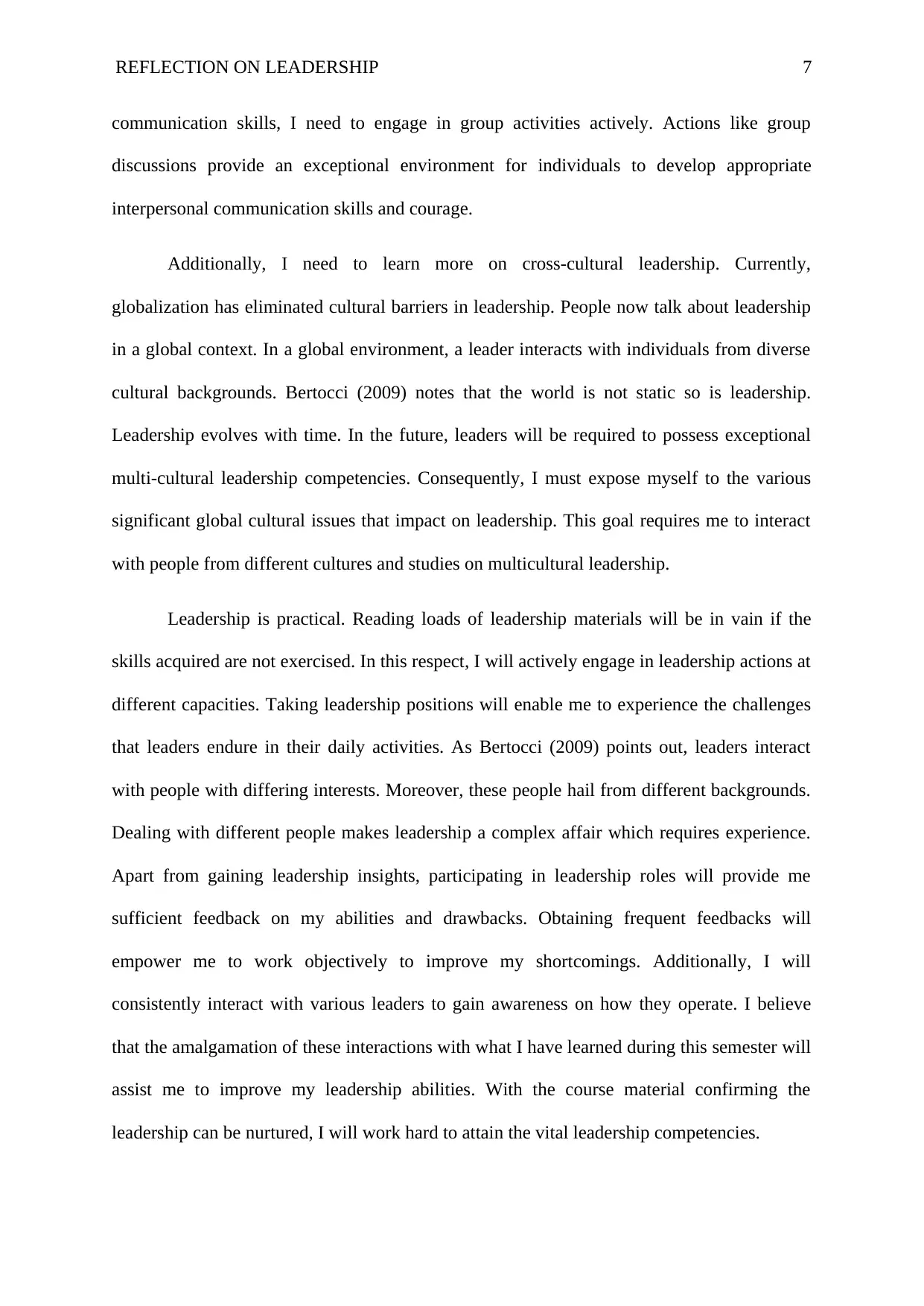
REFLECTION ON LEADERSHIP 7
communication skills, I need to engage in group activities actively. Actions like group
discussions provide an exceptional environment for individuals to develop appropriate
interpersonal communication skills and courage.
Additionally, I need to learn more on cross-cultural leadership. Currently,
globalization has eliminated cultural barriers in leadership. People now talk about leadership
in a global context. In a global environment, a leader interacts with individuals from diverse
cultural backgrounds. Bertocci (2009) notes that the world is not static so is leadership.
Leadership evolves with time. In the future, leaders will be required to possess exceptional
multi-cultural leadership competencies. Consequently, I must expose myself to the various
significant global cultural issues that impact on leadership. This goal requires me to interact
with people from different cultures and studies on multicultural leadership.
Leadership is practical. Reading loads of leadership materials will be in vain if the
skills acquired are not exercised. In this respect, I will actively engage in leadership actions at
different capacities. Taking leadership positions will enable me to experience the challenges
that leaders endure in their daily activities. As Bertocci (2009) points out, leaders interact
with people with differing interests. Moreover, these people hail from different backgrounds.
Dealing with different people makes leadership a complex affair which requires experience.
Apart from gaining leadership insights, participating in leadership roles will provide me
sufficient feedback on my abilities and drawbacks. Obtaining frequent feedbacks will
empower me to work objectively to improve my shortcomings. Additionally, I will
consistently interact with various leaders to gain awareness on how they operate. I believe
that the amalgamation of these interactions with what I have learned during this semester will
assist me to improve my leadership abilities. With the course material confirming the
leadership can be nurtured, I will work hard to attain the vital leadership competencies.
communication skills, I need to engage in group activities actively. Actions like group
discussions provide an exceptional environment for individuals to develop appropriate
interpersonal communication skills and courage.
Additionally, I need to learn more on cross-cultural leadership. Currently,
globalization has eliminated cultural barriers in leadership. People now talk about leadership
in a global context. In a global environment, a leader interacts with individuals from diverse
cultural backgrounds. Bertocci (2009) notes that the world is not static so is leadership.
Leadership evolves with time. In the future, leaders will be required to possess exceptional
multi-cultural leadership competencies. Consequently, I must expose myself to the various
significant global cultural issues that impact on leadership. This goal requires me to interact
with people from different cultures and studies on multicultural leadership.
Leadership is practical. Reading loads of leadership materials will be in vain if the
skills acquired are not exercised. In this respect, I will actively engage in leadership actions at
different capacities. Taking leadership positions will enable me to experience the challenges
that leaders endure in their daily activities. As Bertocci (2009) points out, leaders interact
with people with differing interests. Moreover, these people hail from different backgrounds.
Dealing with different people makes leadership a complex affair which requires experience.
Apart from gaining leadership insights, participating in leadership roles will provide me
sufficient feedback on my abilities and drawbacks. Obtaining frequent feedbacks will
empower me to work objectively to improve my shortcomings. Additionally, I will
consistently interact with various leaders to gain awareness on how they operate. I believe
that the amalgamation of these interactions with what I have learned during this semester will
assist me to improve my leadership abilities. With the course material confirming the
leadership can be nurtured, I will work hard to attain the vital leadership competencies.
Paraphrase This Document
Need a fresh take? Get an instant paraphrase of this document with our AI Paraphraser
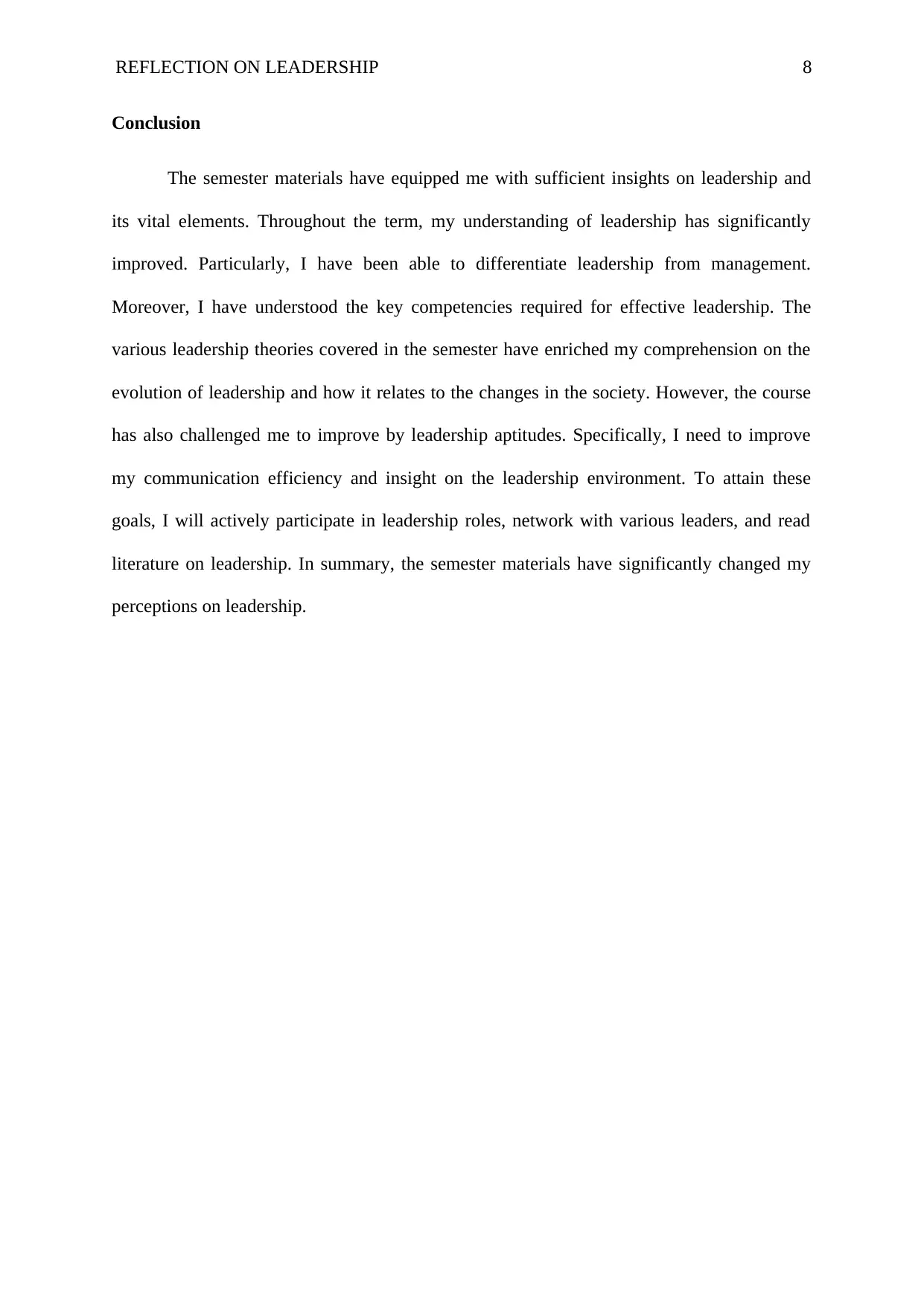
REFLECTION ON LEADERSHIP 8
Conclusion
The semester materials have equipped me with sufficient insights on leadership and
its vital elements. Throughout the term, my understanding of leadership has significantly
improved. Particularly, I have been able to differentiate leadership from management.
Moreover, I have understood the key competencies required for effective leadership. The
various leadership theories covered in the semester have enriched my comprehension on the
evolution of leadership and how it relates to the changes in the society. However, the course
has also challenged me to improve by leadership aptitudes. Specifically, I need to improve
my communication efficiency and insight on the leadership environment. To attain these
goals, I will actively participate in leadership roles, network with various leaders, and read
literature on leadership. In summary, the semester materials have significantly changed my
perceptions on leadership.
Conclusion
The semester materials have equipped me with sufficient insights on leadership and
its vital elements. Throughout the term, my understanding of leadership has significantly
improved. Particularly, I have been able to differentiate leadership from management.
Moreover, I have understood the key competencies required for effective leadership. The
various leadership theories covered in the semester have enriched my comprehension on the
evolution of leadership and how it relates to the changes in the society. However, the course
has also challenged me to improve by leadership aptitudes. Specifically, I need to improve
my communication efficiency and insight on the leadership environment. To attain these
goals, I will actively participate in leadership roles, network with various leaders, and read
literature on leadership. In summary, the semester materials have significantly changed my
perceptions on leadership.
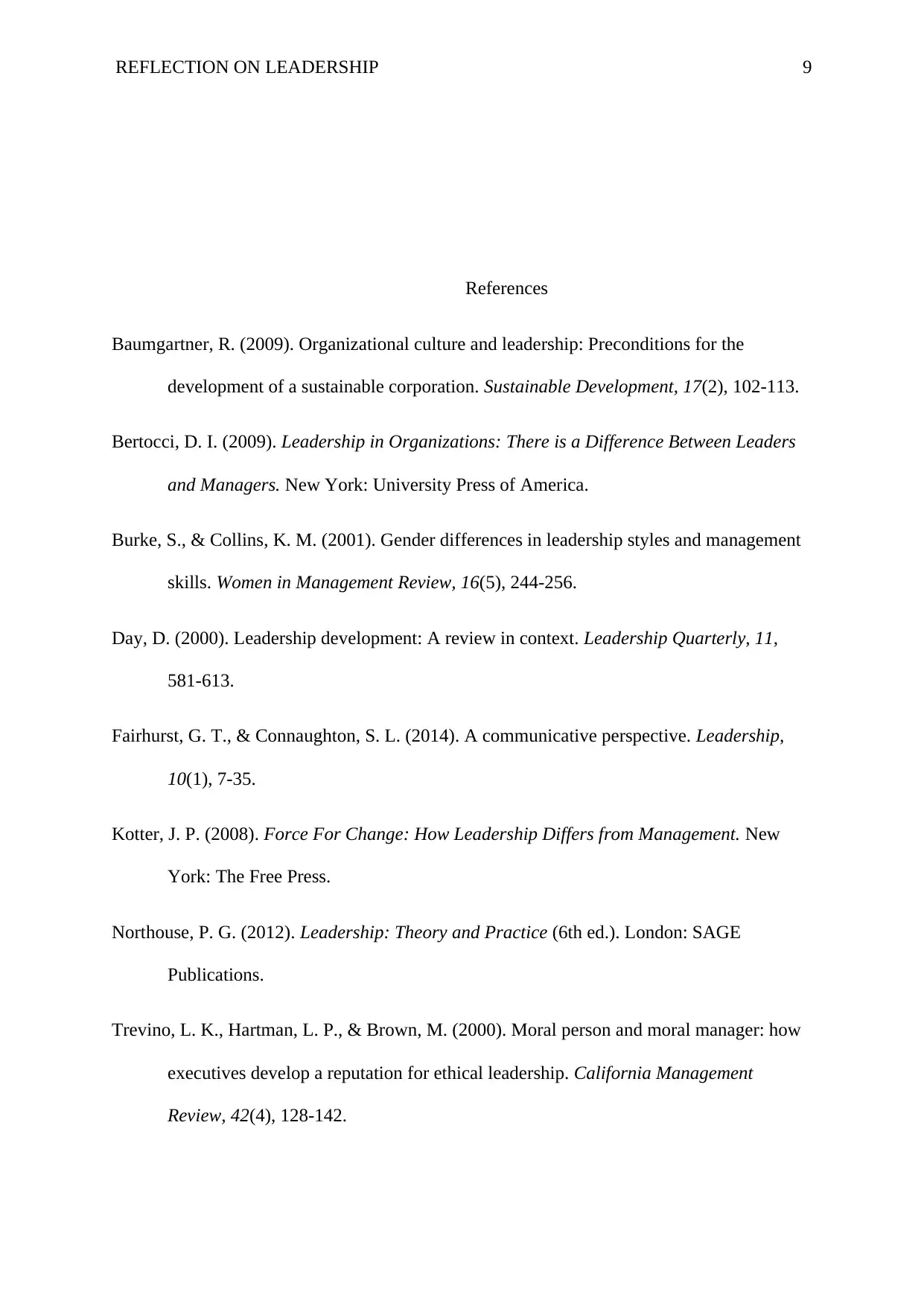
REFLECTION ON LEADERSHIP 9
References
Baumgartner, R. (2009). Organizational culture and leadership: Preconditions for the
development of a sustainable corporation. Sustainable Development, 17(2), 102-113.
Bertocci, D. I. (2009). Leadership in Organizations: There is a Difference Between Leaders
and Managers. New York: University Press of America.
Burke, S., & Collins, K. M. (2001). Gender differences in leadership styles and management
skills. Women in Management Review, 16(5), 244-256.
Day, D. (2000). Leadership development: A review in context. Leadership Quarterly, 11,
581-613.
Fairhurst, G. T., & Connaughton, S. L. (2014). A communicative perspective. Leadership,
10(1), 7-35.
Kotter, J. P. (2008). Force For Change: How Leadership Differs from Management. New
York: The Free Press.
Northouse, P. G. (2012). Leadership: Theory and Practice (6th ed.). London: SAGE
Publications.
Trevino, L. K., Hartman, L. P., & Brown, M. (2000). Moral person and moral manager: how
executives develop a reputation for ethical leadership. California Management
Review, 42(4), 128-142.
References
Baumgartner, R. (2009). Organizational culture and leadership: Preconditions for the
development of a sustainable corporation. Sustainable Development, 17(2), 102-113.
Bertocci, D. I. (2009). Leadership in Organizations: There is a Difference Between Leaders
and Managers. New York: University Press of America.
Burke, S., & Collins, K. M. (2001). Gender differences in leadership styles and management
skills. Women in Management Review, 16(5), 244-256.
Day, D. (2000). Leadership development: A review in context. Leadership Quarterly, 11,
581-613.
Fairhurst, G. T., & Connaughton, S. L. (2014). A communicative perspective. Leadership,
10(1), 7-35.
Kotter, J. P. (2008). Force For Change: How Leadership Differs from Management. New
York: The Free Press.
Northouse, P. G. (2012). Leadership: Theory and Practice (6th ed.). London: SAGE
Publications.
Trevino, L. K., Hartman, L. P., & Brown, M. (2000). Moral person and moral manager: how
executives develop a reputation for ethical leadership. California Management
Review, 42(4), 128-142.
⊘ This is a preview!⊘
Do you want full access?
Subscribe today to unlock all pages.

Trusted by 1+ million students worldwide

REFLECTION ON LEADERSHIP
10
10
1 out of 10
Related Documents
Your All-in-One AI-Powered Toolkit for Academic Success.
+13062052269
info@desklib.com
Available 24*7 on WhatsApp / Email
![[object Object]](/_next/static/media/star-bottom.7253800d.svg)
Unlock your academic potential
Copyright © 2020–2026 A2Z Services. All Rights Reserved. Developed and managed by ZUCOL.





